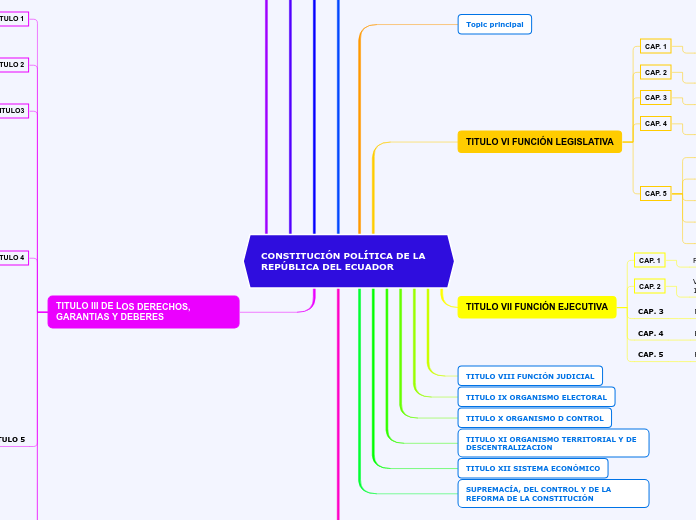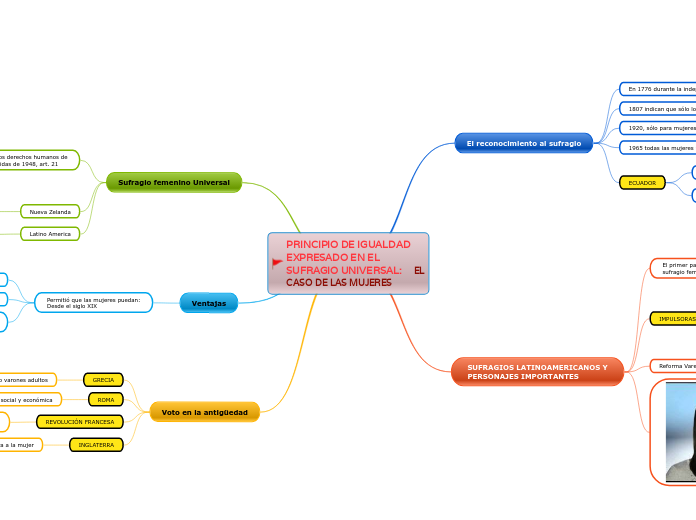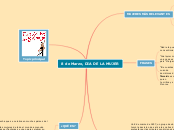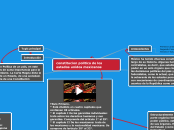ORGANIZA
CONSTITUCIÓN POLÍTICA DE LA REPÚBLICA DEL ECUADOR
The part of speech is a category to which a word is assigned according to its syntactic functions. In English the main parts of speech are noun, pronoun, adjective, determiner, verb, adverb, preposition, conjunction, and interjection.
TITULO V INSTITUCIONES DEL ESTADO Y LA FUNCIÓN PUBLICA
An adjective is a word that's used to describe a specific noun and to provide more detail to the listener.
CAP- 2
Superlative adjectives demonstrate a higher level of comparison between entities.
FUNCIÓN PUBLICA ART. 120- 125
Expresses a comparison between two entities or groups of entities in quality or degree.
INSTITUCIONES DEL ESTADO ART 118
TITULO III DE LOS DERECHOS, GARANTIAS Y DEBERES
A conjunction is a word like 'if' 'but' or 'and' which is used to connect sentences or clauses together.
CAPITULO 7
DEBERES Y RESPONSABILIDADES ART 97
CAPITULO 6
DEFENSORIA DEL PUEBLO ART. ART 96
DEL AMPARO ART. 94
HABEAS DATA ART. 94
HABEAS CORPUS ART. 93
GARANTÍA DE LOS DERECHOS
CAPITULO 5
SECCIÓN TERCERA DE LOS CONSUMIDORES ART. 92
SECCIÓN SEGUNDA DE MEDIO AMBIENTE ART. 86-91
SECCIÓN PRIMERA DE LOS PUEBLOS INDÍGENAS Y NEGROS O AFROECUATORIANOS ART. 83-85
DE LO DERECHOS COLECTIVOS
CAPITULO 4
SECCIÓN UNDÉCIMA
SECCIÓN DÉCIMA
DE LA COMUNICACIÓN ART 81
SECCIÓN NOVENA
DE LA CIENCIA Y TECNOLOGÍA ART 80
SECCIÓN OCTAVA
DE LA EDUCACIÓN ART. 66-79
SECCIÓN SEPTIMA
DE LA CULTURA ART. 62-65
SECCIÓN SEXTA
DE LA SEGURIDAD SOCIAL ART. 55-61
SECCIÓN CUARTA
DE LOS GRUPOS VULNERABLES ART. 41- 54
SECCION TERCERA
DE LA FAMILIA ART. 37-40
SECCIÓN SEGUNDA
DEL TRABAJO ART. 35-36
SECCIÓN PRIMERA
DE LA PROPIEDAD ART. 30-34
DE LOS DERECHOS ECONÓMICOS, SOCIALES Y CULTURALES
CAPITULO3
ART. 26-29
DE LOS DERECHOS POLITICOS
Subordinating conjunctions are conjunctions that are used at the beginning of subordinate clauses. Some examples of these conjunctions are: although, after, before, because, how, if, once, since, so that, until, unless, when etc.
ART. 23-25
DE LOS DERECHOS CIVILES
Coordinating conjunctions always connect phrases, words, and clauses. They are: for, and, nor, but, or, yet, so.
ART. 16-22
PRINCIPIOS GENERALES
TITULO II DE LOS HABITANTES
A preposition is one of the most exciting parts of grammar. A preposition is used to describe the location of something in relation to something else.
CAPITULO 2
Compound preposition consists of two or more words.
ART. 13- 15
DE LOS EXTRANJEROS
CAPITULO 1
When a preposition consists of one word it is called single or simple preposition.
DE LOS ECUATORIANOS ART. 6-12
TITULO I DE LOS PRINCIPIOS FUNDAMENTALES
An adverb is used to describe a verb, but it can also describe an adjective or another adverb.
Adverbs normally help paint a fuller picture by describing how something happens.
ARTICULO
DEL 1 - 5
TITULOS
A numeral is a word or phrase that describes a numerical quantity.
Some theories of grammar use the word 'numeral' to refer to cardinal numbers that act as a determiner to specify the quantity of a noun, for example the 'two' in 'two hats'.
CAPÍTULOS
SUPREMACÍA, DEL CONTROL Y DE LA REFORMA DE LA CONSTITUCIÓN
TITULO XII SISTEMA ECONÓMICO
TITULO XI ORGANISMO TERRITORIAL Y DE DESCENTRALIZACION
TITULO X ORGANISMO D CONTROL
TITULO IX ORGANISMO ELECTORAL
TITULO VIII FUNCIÓN JUDICIAL
TITULO VII FUNCIÓN EJECUTIVA
An article is a word used to modify a noun, which is a person, place, object, or idea. Technically, an article is an adjective, which is any word that modifies a noun.
FUERZA PUBLICA ART. 183- 190
ESTADO DE EMERGENCIA ART. 180- 182
MINISTROS DEL ESTADO ART. 176- 179
Indefinite articles are the words 'a' and 'an.' Each of these articles is used to refer to a noun, but the noun being referred to is not a specific person, place, object, or idea. It can be any noun from a group of nouns.
VICEPRESIDENTE DE LA REPÚBLICA ART. 172- 175
It refers directly to a specific noun or groups of nouns.
PRESIDENTE DE LA REPÚBLICA ART. 164- 171
TITULO VI FUNCIÓN LEGISLATIVA
A pronoun is a word that can be used in place of a noun, typically after the noun itself has already been stated.
CAP. 5
A reflexive pronoun ends with ...self or ...selves and refers to another noun or pronoun in the sentence (usually the subject of the sentence). The reflexive pronouns are myself, yourself, herself, himself, itself, ourselves, yourselves, and themselves.
SECCIÓN 4 TRAMITE DE COMITÉ ART 157-160
SECCIÓN 3 TRAMITE ORDINARIO ART. 157 . 160
SECCIÓN 2 INICIATIVA ART. 144-149
SECCIÓN 1 CLASES DE LEYES ART. 140-143
LAS LEYES
CAP. 4
Reciprocal pronouns are used for actions or feelings that are reciprocated. The reciprocal pronouns are each other and one another.
COMISIÓN DE LEGISLACIÓN Y CODIFICACIÓN ART. 138-139
CAP. 3
Demonstrative pronouns are used to demonstrate (or indicate). This, that, these, and those are all demonstrative pronouns.
DIPUTADOS ART. 135- 137
CAP. 2
Possessive pronouns are used to show possession. The possessive pronouns are mine, yours, his, hers, ours, and theirs.
ORGANIZACIÓN Y EL FUNCIONAMIENTO ART. 131-134
CAP. 1
The personal pronouns are I, you, he, she, it, we, they. More often than not (but certainly not always), they replace nouns representing people.
CONGRESO NACIONAL ART. 126-130
Topic principal









